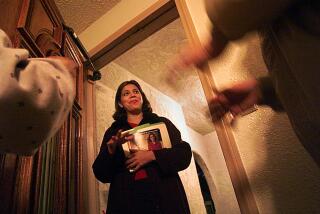A Woman’s Place Was on the Farm : COYA COME HOME A Congresswoman’s Journey <i> by Gretchen Urnes Beito (Pomegranate Press: $19.95; 334 pp., illustrated; 0-938817-02-7)</i>
- Share via
On May 4, 1958, after Minnesota’s Democratic Farmer Labor Party (DFL) had endorsed Coya Knutson for a third term in Congress, her husband Andy Knutson released to the press an open letter ordering his wife not to run for office again. In covering the story, The Fargo Forum coined the phrase “Coya, Come Home.” Picked up by the Associated Press, “Coya, Come Home” found its way onto front pages across the country.
Coya Knutson’s Washington career was dead. Oh, she ran, but Andy’s original release and a subsequent statement accusing her aide, Bill Kjeldahl, of alienating her affections, provided ammunition for every Minnesota politician she had ever crossed. And she had crossed a number of them, including Hubert Humphrey. She was one of those irritating women who act independently and according to conscience. When it was time for the party to stand by its woman, many of the power brokers hung her out to dry.
It wasn’t only the DFL, however, but a strong strain of anti-feminism running across the electorate which defeated Coya, despite the fact that no shred of evidence supported the allegations of an alcoholic, paranoid husband. From around the country she received letters quoting scripture and advising her to hie herself home to hearth and husband. That she lost the ’58 election to Republican Odin Langen by only 1,500 votes is the measure of Coya’s charisma, grit and legislative record. She ran like hell and nearly beat the odds.
In losing Coya Knutson from politics, more was lost than a colorful accordion player who accompanied herself singing campaign songs as she stumped the back roads of Minnesota. Lost was a kind of heroic, innocent, energized can-do.
As a young farm wife, she’d come under the sway of Eleanor Roosevelt, whose broadcasts encouraged and admonished women to take a more active political role, to seek out in the community those with needs and problems unheeded by the system and to find solutions to them. Mrs. Roosevelt touched in Coya a center of compassion and concern, giving her not just permission but instruction to become a political person.
With reverberating laughter and sleeves rolled up, Coya took on the legislative process in Washington, championing better farm prices, fairer Indian policies, loans for college students and a host of issues, many ahead of their time but realized in future sessions by other lawmakers.
Walter Mondale described Coya as a “sparkling, exuberant, bubbling, happy Scandinavian--heading for the moon. She was full of life. She was electric and people liked her. She was kind of like Humphrey. She could go into a room and get the dead to wake up.”
It should be noted that Andy Knutson recanted his statements, and following the election testified to the House Elections Committee that his open letters had been composed with help from members of the DFL eager for reasons of their own to see Coya out of office, even should that mean Republican representation.
Had Coya Knutson, a proven vote-getter, been a man, doubtless the same people who brought her down would have looked upon her as a conscience-driven maverick instead of an uppity little woman who didn’t know when she was well off.
Whether we’ve come so far from the Coya Knutson story that it could not be repeated is a question left unaddressed in “Coya Come Home.” While the book is biography, not political science, it is the political science, the feminist issues at its heart, which give it relevance and which should have been more deeply explored.
Beito has done her research and she has let Coya speak, but her book could have been more satisfying and valuable if she had extracted conclusions or challenged the reader to thought with probing questions. Coya Knutson’s story is proper reading, however, for all who are concerned with the political life of women in the United States and for all students of women’s studies.
Although Beito’s prose is pedestrian and her insights few, the reader will find reward in history chronicled, and in Coya, a woman too irrepressible to get lost in it.
More to Read
Get the L.A. Times Politics newsletter
Deeply reported insights into legislation, politics and policy from Sacramento, Washington and beyond. In your inbox twice per week.
You may occasionally receive promotional content from the Los Angeles Times.










